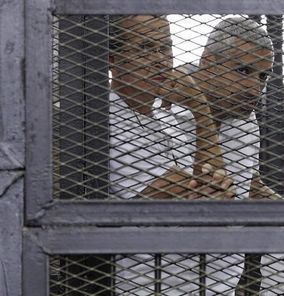Freed Al Jazeera journalist Peter Greste vows to fight for detained colleagues
Freed Al Jazeera and former BBC journalist Peter Greste “won’t rest” until his colleagues are released, his family has said. Mr Greste’s deportation from Egypt after 400 days in prison has been greeted as a “welcome relief” by human rights campaigners. The Australian journalist left on an EgyptAir flight to Larnaca, Cyprus, after the president approved his deportation in a case that has drawn international condemnation. Mr Greste, 49, was arrested in December 2013 and imprisoned last June on charges that included spreading false news. He was jailed with two other al-Jazeera journalists - Egyptian-Canadian Mohamed Fahmy and Egyptian Baher Mohamed. His family, who managed to speak to him on the phone, said he was in “great spirits” and would return to Australia “when he is ready”.
On a sombre note, I know Peter wanted me to make this point - Peter’s two other colleagues are still there. They also deserve to be freed. Peter won’t rest until they are released from prison.
Andrew Greste, brother of freed Australian journalist Peter Greste
Greste and his colleagues were sentenced to at least seven years in prison on terrorism-related charges last year in a trial described as a sham by rights groups. There was no immediate word on the other two journalists. But Greste was released following a presidential “approval”, officials said, following a new deportation law passed last year. The convictions of all three men were overturned by the Court of Cassation on January 1 on procedural grounds, but they were kept in detention pending a retrial. Mr Greste had been in Egypt for only weeks, working on a short relief for his colleagues, when he was detained. The case prompted a storm of international criticism and a protest campaign using the hashtag #FreeAJStaff went global. It featured fellow journalists who posed for photographs with their mouths covered as a sign of support.
[Peter Greste] was jailed for nothing more than doing his job, all our thoughts must now be with his two colleagues in the hope that they too will shortly be freed”.
BBC News and Current Affairs director James Harding

Middle East FreeAJStaff